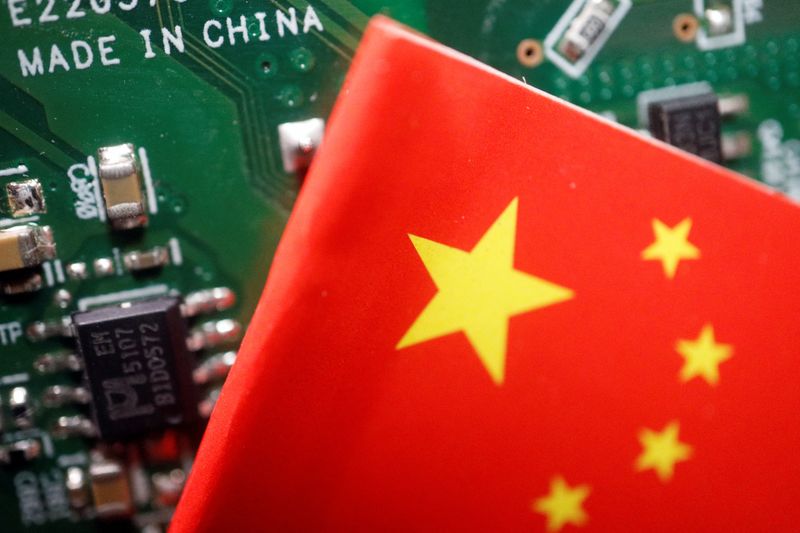By David Lawder
WASHINGTON (Reuters) – The Biden administration on Monday announced a last-minute trade investigation into Chinese-made “legacy” semiconductors that could heap more U.S. tariffs on chips from China that power everyday goods from autos to washing machines to telecoms gear.
The “Section 301” probe, launched just four weeks before President-elect Donald Trump takes office on Jan. 20, will be handed over to his administration in January for completion, Biden administration officials said.
The effort could offer Trump a ready avenue to begin imposing some of the hefty, 60% tariffs that he has threatened on Chinese imports.
Departing President Joe Biden has already imposed a 50% U.S. tariff on Chinese semiconductors that starts on Jan. 1. His administration has tightened export curbs on advanced AI and memory chips and chipmaking equipment to China and also recently increased tariffs to 50% on Chinese solar wafers and polysilicon.
The U.S. Trade Representative’s office, which will conduct the new probe, said it is aimed at protecting American and other market-driven chip producers from China’s massive state-driven buildup of domestic chip supply.
U.S. Trade Representative Katherine Tai said that the trade agency has found evidence that Beijing is targeting the semiconductor industry for global domination, similar to its buildup in steel, aluminum, solar panels, electric vehicles and critical minerals.
“This is enabling its companies to rapidly expand capacity and to offer artificially lower priced chips that threaten to significantly harm and potentially eliminate their market-oriented competition,” she told reporters on a conference call.
Legacy chips use older, mature manufacturing processes and are found in a wide range of mass market applications. They do not include advanced chips for use in artificial intelligence applications or sophisticated microprocessors.
The Biden administration will begin accepting public comments on the probe on Jan. 6, and has planned a public hearing for March 11-12, according to a Federal Register notice on the probe. It is unclear whether Trump’s choice to lead USTR, Jamieson Greer, a trade lawyer and former USTR chief during Trump’s first administration, will be confirmed by the U.S. Senate by then.
The probe is being conducted under Section 301 of the Trade Act of 1974, the same unfair trade practices statute that Trump invoked to impose tariffs of up to 25% on some $370 billion worth of Chinese imports in 2018 and 2019, triggering a nearly three-year trade war with Beijing.
If Trump takes up the probe, it needs to be completed within a year from initiation.
DOWNSTREAM GOODS PROBED
A Biden administration official said in addition to examining the impact of the imported chips themselves, the probe would also look at their incorporation into downstream components and end-use goods for critical industries including defense, automotive products and medical devices.
It also will target China’s production of silicon carbide substrates and wafers for semiconductor fabrication.
U.S. Commerce Secretary Gina Raimondo said her department’s research shows two-thirds of U.S. products using chips had Chinese legacy chips in them, and half of U.S. companies did not know the origin of their chips including some in the defense industry, findings that were “fairly alarming.”
After the COVID-19 pandemic disrupted the supply of semiconductors and temporarily halted production of autos and medical equipment, the U.S. has sought to build its own semiconductor supply chain with $52.7 billion in new subsidies for chip production, research and workforce development.
But Raimondo said China’s plans to build more than 60% of the world’s new legacy chip capacity over the next decade were discouraging investment elsewhere and constituted unfair competition.
It “undercuts our companies and makes the U.S. dependent on China for the chips that we use every day in so many things,” she told reporters.
Despite a bitter presidential campaign, one of the few areas of continuity between Biden’s and Trump’s administrations will be tariffs on China. Biden kept in place all of the duties on Chinese imports imposed by Trump and added to them, including 100% duties on Chinese-made electric vehicles in an effort to keep them out of the U.S. market.




























